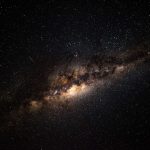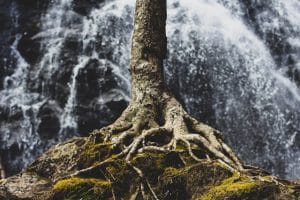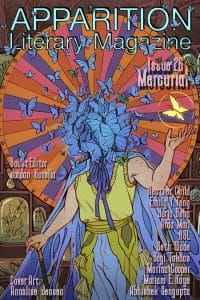My name in your language translates to “Sheer.” The sound of it is like clear ringing bells. It was given to me for the rock face that echoed my screams as I entered the world; were I to introduce myself in my own tongue, those screams are all you would hear.
After the cavity was seared open and I was lifted steaming into the cold, I met the eyes of the one whose body had encased me. They were mountain seed, their eyes grey. They didn’t live long enough to scrape and eat the fibres suspending my limbs. Those were divided, with the rest of its vacated body, and shared.
I ate, my mouth already toothed. Bodies ejecting both souls in birthing had become so commonplace that this was no longer considered good luck.
Even then we were few. It was a meal of weeks. After me, there came three more–one craggy; one emaciated; one already cool as stone. None of their vessels resealed behind them, and none of them lived long enough to eat to the bone.
This is just to say that there was brutality in the world even before you came. In that cave there were no comforts. The hot spring rarely ran still enough for reflections, but I knew that my eyes were grey. Too much mountain seed. We had become as peaked and pinched as the surrounding alpine, though not nearly so resilient.
*
Steppe–another translation; I was told that their name was the sound of the wind across a long expanse of flat land–had eyes that suggested the possibility of gold. They were the product of grassland seed, the last seed we took from outside, many generations previous. It had been so long that Steppe would always say they were only mountain, but I could see an unfamiliar world in their soft-padded feet and sparse pelt.
Steppe’s body didn’t open anymore. Before they sealed, they had seeded many children, the base of the mountain widening in each new iris.
It was Steppe and me for many years. I could remember some of what it had been before, but my memories were only a reprieve from digging survival out of sediment with just four hands between us. I missed the far reach of five people coaxing food out of sparseness. Steppe remembered family. They remembered second and third and fourth voices to fill in the gaps in the story. As time went on, there were more and more gaps.
Still, they remembered sufficiently to impart on me some clarity. The night the lights in the sky took the same positions of the night of my birth, the seam down the middle of my chest began to glow. I knew I was ready to open and I was not afraid. Steppe had told me that this would happen. I pressed the crease and there was heat. I knew we would leave the mountain.
*
Steppe had been to the place of their namesake. Steppe had been to places where the water was wide and where the water was salt. Steppe had seen creatures even more tender-footed than they, whose skin split open wet like summer fruit on sharp rock, creatures unfurred, creatures with nubs or elegant prongs instead of the thick armour of spiraling horns.
“We don’t need seed from far,” Steppe said. “If we took from ocean or plain, that might be worse than mountain. Tundra would be ideal, but I haven’t seen anyone from the tundra in years, even before I sealed. We would do best to take from the forest, from our hosts. We need thick fur and muscle and fat.”
“Thick fur and muscle and fat will be difficult to fight,” I said.
“We will pick a small one,” Steppe replied.
The first year of opening wasn’t always like this. There were groups of us large enough and varied enough in age that those in flower could do voluntary exchanges–a seed given for a seed to be passed to the young. We were too close to gone for such kindness. Even if anyone wanted to trade, we had nothing to offer.
It would have been purposeless to ask what would happen to Steppe if they were discovered sterile at a gathering intended for breeding. There was no one else to guide me. We couldn’t waste time fearing the consequences of the only available choice. We veered over the mountain face like two droplets of trembling water. There were many likelihoods, and all the happy ones slim.
We left when the moon was full on one side, a sliver away on the other. The glowing lines on my chest no longer kept me awake at night. Steppe said that we were lucky: I had come of age in a forest year. The previous year had been ocean, and Steppe had paced with fret for days before the stars were in place.
I don’t know much about your bodies, but I know that it’s not a sure thing for you either, when you ripen. Had it happened to me in the ocean year, we would have had to make a journey through entire seasons. The walk to the forest meeting place was short. It was one I could make back alone.
The possibility of Steppe’s death hung above us like a laden branch. I was not ready to face the familiar world without them, even less to lift a new and wailing growth from my own body and to name it for a sound from my limited lexicon.
On our third day of walking, I saw a bird so small it looked halved; its song was the same size. I worked the membraned valves in my face until I could produce an echo.
“It will be a good name,” Steppe said, “a few generations from now. This one cannot be named anything so sweet.”
I listened for more appropriate sounds–a long-dead tree finally falling, the creatures it fell upon, those tiny and hard-shelled turning the carrion over and over.
On our fourth day, we came upon the river. I smelled fresh water and felt the blush of hot damp in my cheeks. A great crack sounded through the forest. Steppe took my face in their hands and turned it in the direction from which the river ran. Ice broke off in great sheets. I repeated the sound of it breaking, more quietly, to myself. This was a name.
*
We saw the first of us soon after. Sliding down a small bluff, where the snow gave way to mud, we startled them under a nest of early eggs.
They were difficult to see, their pelt white and beaded with oil and water. Their back legs, shaking with the effort of reaching for the nest, were long, strong, and slender. Around their neck and trailing the opening on their chest was a burst of dark-speckled feathers. These rose in alarm when they turned and spotted us in the brush. The antlers were slim, black and twined with a green-leaved plant, a plant with leaves like razors.
Their small grey hands, capped with smaller grey claws, clenched into the grooves in the bark when they saw us. Their black eyes widened until I could see the whites. I felt them looking at my own broad face and the unkempt shag of my winter coat.
They took off running and Steppe gave chase.
I ran too. The air that usually burned came easy, but the terrain was soft. I tripped and was caked with the loosening earth. The other was no more used to the soft ground than we were. One large, elegant leap made long stripes in the wet. Their flank landed hard and the air left their body, whistling and hoarse at once.
Steppe was upon them before they could lift themselves out of the muck. I heard the opening bleat of a cry for help and Steppe choked it off with their weight on the creature’s throat. Their eyes bulged; their limbs splattered. All those beautiful feathers were split and soaked.
“Quickly,” Steppe said to me.
It was a sorry thing. There was no willing exchange, no dutiful submission to defeat. They flailed so violently I had to press their legs into the earth with the weight of my body.
“We shouldn’t,” I said.
“It won’t hurt,” said Steppe.
I could not say that wasn’t what I feared. My mouth full of bitterness, I lifted the feathers away from the glowing seam, seized one of the stranger’s hands, clenched it, and ran a single grey finger down the length of the light.
They shuddered and whimpered as their body fell open.
Inside was the cavernous ribbed pink, and nothing else.
“They’re empty,” I said. “This is their first year too.”
Steppe contorted to look inside, as though I had some reason to lie. They saw the pulsating muscle cramping around nothing and spat into the woods behind them.
“This was our best chance,” they said.
“I’m strong,” I said. “I can best someone.”
I could see in the hardness of Steppe’s face that this was never the plan.
“You’re mountain,” they said. “No one would agree to fight you. Especially now. As soon as we release this one, they’ll run back to the others and say what happened. We will be hunted back to our own ground. If we make it, we will never leave again.”
They looked down at the young thing that still twitched between us. I knew what Steppe’s next idea must be and couldn’t fathom either outcome, turning this body into meat or breaking the pattern of survival by obedience in an unfamiliar wood.
It was then that the youth’s hands softened around mine, the salt of their palms stinging the cuts they had made trying to crack my grip. They were still open; our folded fingers hung above the gap. I looked at their face. Their eyes were beseeching, but less wide.
“Let them speak,” I said.
“They’ll scream.”
“Then let them scream.” I shoved Steppe off their windpipe.
The creature gasped raggedly and choked.
I cast a glower on Steppe. Their desperation was bare and obscene.
“I can get you seed,” the creature said, and coughed.
Steppe laughed.
“Why would you do that for us?” I asked.
This close, their eyes were not black, but grey–not my grey; darker, like the remains of what a fire eats, and just as heated.
“I’m tundra,” said the mouth.
“You’re not,” Steppe said.
“I am.”
“Tundra died out.”
“Nearly,” said the creature. “The ice we used to cross every spring broke. We spent years trying to find another way. Many of us died. We kept trying. We know what happens when like stays with like for too long.”
They looked at the crooked shape of me and I was filled with shame.
“We made exchanges for fire mountain seed,” they said. “That’s why my eyes aren’t tundra white. With the new alliance, they showed us the way to cross through their territory. That’s how we made our way back. It’s our third spring. When we first returned, everyone told us they thought we had gone the way of mountain.”
They looked up at me, and then at Steppe.
“You’re the last?” they asked.
“We are,” I said.
“Child,” said Steppe.
“It’s no more harmful than anything else they know about us.”
Steppe rose abruptly and began scraping the drying dirt from their pelt against a tree’s rough skin. I let go of the creature’s warm hands and closed their body softly. I wanted to make an apology but none would be sufficient. I lifted my weight off them.
“You still haven’t explained how you would help us,” I said, “or why.”
Sitting up, they said, “I’ve heard the others talk about it. Even when we prove we can survive, no one wants us. We’ve had to fight every year that we’ve come. They’ll keep pushing us to the brink of oblivion, unless we can find another way.”
They reached out and touched the center of my glowing line.
“If you are brought to flower you will return with seed,” they said. “We will all be made stronger this way.”
I looked to Steppe. The shocks of gold in their coat gleamed wetly, the bark of the tree caked with second-hand grime.
“What’s the alternative?” I asked. “We try to scrape seed from some other unwilling body. We fight and go home limping. We turn back now and try again next year. We die out in the centre of that rock.”
Steppe was staring upward, their eyes unfixed. I knew they could not see the mountain from there; the trees were too tall. I couldn’t bear for them to be sentimental at the same time as ruthless.
“Add this to the litany,” I said. “Now we know what you’ll do to preserve your blood. Why not this?”
Steppe did not flinch. They went on staring upward at what could only be the tops of the trees, by turns needled and naked. When they finally lowered their gaze to where I was still crouched, it was appraising.
They had looked at me this way before. Are there so many lost children in the planes of my face? In the plate of my forehead, the lines of my nose, the curves of my cheekbones–do they see the cracked-open ribs of the one who carried me?
They turned, and the points of their antlers disappeared behind the bow of their head.
“We’ll come,” I said to the one from the tundra.
As we made our way through the trees, I asked the one from the tundra for their name. They made a sound not unlike the one I had heard earlier and repeated. This was lower and had movement, a sense of spanning. They told me that it was the sound of heated rock hitting the cold sea, the point at which it becomes still. There is no translation I can offer you.
*
The group from the tundra was staying in a cave vacated by a newly-awoken bear. To get there, we had to skirt the clearing where the others gathered. We kept to the thickening trees, but curiosity calcified at the base of my throat. Nudging me towards the sounds, Steppe moved backwards into shadow.
“It’s safer for us to stop now, in the light,” they said, absentmindedly touching the slim trail on their chest that was still hairless but no longer illuminated. “Go. Look.”
The tundra came with me. They must have seen it before, but when I looked I knew I would never tire of looking.
The clearing had been made generations past, too many to count. Our ancestors gnawed the trees down and dug up their roots. The space was enormous. Now in the path of the sun, what grew there–long blades of grass and flowers with veined, translucent petals–was tender. On the other side ran the river, its steam fragrant with smoothed stone and fish. A great rock cluster baked.
Atop it, and wading in the river, and rustling the foliage, bowing their heads to rub their faces luxuriously in the earth, stretching and sunning, moving the membranes behind their fur and bone to make sound, were the others, like me and not.
The ones from the desert were all spikes and scales, eyes somehow blinking twice, black feathers and pink mottled skin, jaws yawning far past the possibility of hinged bones, tails like none I’d ever seen, all golden and brown and beige.
“The colours of sand,” Steppe told me. I didn’t know what sand was.
There was a group of alien brightness, garish stripes and shuddering fronds, fans of iridescence reflective and blinding. Bodies from a place where survival was not hiding, bodies that were used to being looked at, that demanded it. They lured me, as certainly delicious as the rare spring fruit.
And another–slim-feathered or else slabbed with fat, wrinkled skin and bristles, prongs hanging plants limp and soaking, everything dotted with brine. They slid into the water as easily as the snow off the mountain and into the trees, laboured out and slid in again. Some never came out; they pushed their heads through the river’s surface, carrying the water with them for a moment in a sheet, gossamer and glittering like birds’ feathers or a specific sort of stone.
“Ocean,” Steppe said, “and the cliffs around it. They survive by numbers. Ocean water is different from river water. Only some can survive the change, and many of those who can, only for a short time. They lose many on the journey in, more on the journey out. They’re fortunate their groups are so large.”
I didn’t have to ask about our hosts. I knew the other cold regions; their pelts were oily, like mine, so that when the ice and the water melted they would roll off in beads, their noses broad to cool the air so they would not sweat and freeze. Every inch of them was furred, long strands reaching down to cover even their hooves.
“Why does no one ever come to the mountain?” I asked.
“They used to,” Steppe said, “but to host, the group must be present in the year before their turn.”
“How long has it been only you two?” the tundra asked.
“Since not long after they were born,” Steppe said, and I was surprised by the softness of their voice. “The last of us came of age in the same year. We seeded them as soon as we could.”
“They died in birthing,” the tundra said. It wasn’t a question, and Steppe didn’t answer it.
“Sheer is the last strong child I pulled from a body,” Steppe said.
Steppe discussed the other babies even more seldom than they used my name. My name–a scream and then its strike and echo, a sound angrier than I was on the night I was lifted from softness and safety into the flint of the world, angrier than I have ever been since.
“The others lost their appetites and put on no flesh while carrying,” Steppe said. “Sheer, though–through their carrier they ate into my portions. I knew then that the child was strong. Would that we could pass our traits backwards. You would have carried generations on your unbent back.”
I did not look back at Steppe’s face half-shrouded in shadow. They had never spoken to me like this before. I let my mind’s tendrils stroke the grain of their words, feeling for fault. I didn’t want to open myself to the possibility of their insincerity, of more harshness.
“We should go,” I said.
Dark came early. All that was visible of this menagerie were the lights that bisected their chests.
*
The cave was set back from the clearing and already cupped in shadow, the sun fleeing these needle-prickled parts first. The tundra held aside boughs, bent under them, and passed their ends to us. Small parts snapped off in our fingers and sprayed the air with the smell of green.
No light lapped at the cave’s edges. I could see its shape only by looking away. It evoked the bear that had lived in it–a long-slept animal rising spine first from its bedding.
“Wait here,” the tundra said. “I’ll tell them that you’re coming.”
I felt but did not see them leave, heard their hooves click on the stone steps leading upward.
We can trust them. I held the words in my mouth but stayed silent. Steppe, too, said nothing.
In the mouth of the cave, a glow bobbed. Four shapes appeared branded in the darkness. I brought my body to them shaking.
They smelled like salt water and the shattering fractals of sheeted ice. I heard them smelling me too, and felt hot breath on the crown of my skull. We followed them in, led by the light of their chests reflecting on the walls’ glinting minerals.
The rest were in a stone pocket at the back of the cave, where the ceiling began to slope into the earth. There were enough of them that the light they cast was brighter than the full moon. I could see their breath in a single mist. As we entered, they turned, leaves blinking in an easy breeze. I saw our guide standing among them, one of few with black eyes among all the blank, staring white.
I tried to say to myself what Steppe might say about these bodies. In them I saw a wasteland of ice, the doom of it cracked over dark water, the terror of a mountain pass for those with no mountain seed.
The one who approached us came from the back, shouldering through fur and feather. Their face was a perfect round, their ears small and pointed, their white eyes rimmed with lashes long and dark. They had no antlers and their leaves grew singular through their pelt, one and one and one, like freckles. I did not realize that I was backing away until Steppe’s hands came down on my shoulders.
“It’s all right,” they said.
The creature ran their finger down their seam and it opened with a breath. Inside, a bedrock of sinew. It expanded around the stalk of a plant with the same leaves as grew on the creature’s belly. A pod was hanging. They reached in and plucked it with a delicate snap, plied it open easily with their dexterous fingers, and stepped towards me.
This time I did not shy away. They knelt before me with the seed-filled pod open in their palms. I ran a finger down my own chest and was flooded with the chill, sharp in my throat. They selected a seed from the rows and their hand disappeared inside of me.
“If you are strong,” they said, “this plant will allow you to bear twice. You will replace yourself the first year, and grow your numbers the second. On the third year, you’ll meet us again, and give us seed in repayment.”
I felt them lay the seed in the tissue.
They rose from their knees and closed my body cavity with both hands. I felt transparent as the stream that holds the fish. They turned to Steppe.
“You have to survive,” they said, “to keep the new ones safe while this one returns to us.”
The stranger did not wait for any ill-fated promises. They returned to the crowd gathered for heat and disappeared into their ranks. All the faces turned away, back towards the center of their combined light. I searched but could not find the face of our guide before Steppe started steering me back to the cave’s opening, where the forest waited.
*
On the way back, I expected to feel different. I expected to feel the miniscule weight of the seed burden my steps. There was nothing. I felt only the nausea of fear as we passed the clearing again, where the kindnesses of daylight were over and I could see violent light warring. Mating calls do not sound like birdsong.
I kept close to Steppe, shielding their body with mine, until we were far enough away that the screams were only echoes. We sheltered in the carved-out trunk of a fallen tree, the cold sealed out by our pressing fur. In that first night, I heard variations of my name over and over.
*
After our return, our place in the mountain seemed impossibly large. I saw for the first time the true expanse of the floor, how the ledges had been smoothed by so many years of holding sleeping bodies. The hot spring babbled into the emptiness. Its surface broke my reflection, as it had done many reflections before mine.
It wasn’t until the seed became a stalk became a vine clenching my body shut, holding new flesh aloft and I was too large to move without difficulty, that Steppe described to me the first signs of you. I could not venture out of the cave to confirm. I thought that age had at long last cracked the workings of their mind.
Then at last you were close enough that I knew of your coming even from the mouth of the cave. I had only just learned that the world was larger than I ever could have imagined; soon I would have to learn that it was even larger than that, and mostly yours. I still held onto our dreamed future, the dream that we had a future at all.
As the smoke and strange, oily lights moved ever closer to us, I repeated over and over the name that I believed would echo where my screams had, the name that would teach the stone the sound of determined spring.
Marlena Evans lives in Hamilton, Ontario with a clowder of three tabbies, several dead plants, and a deeply cynical bird.
Featured Image: michal-parzuchowski






